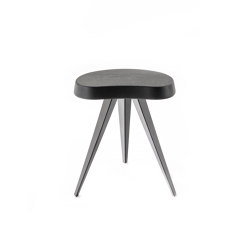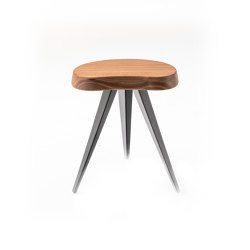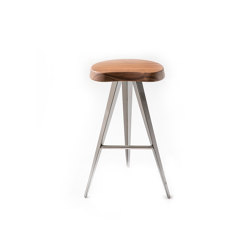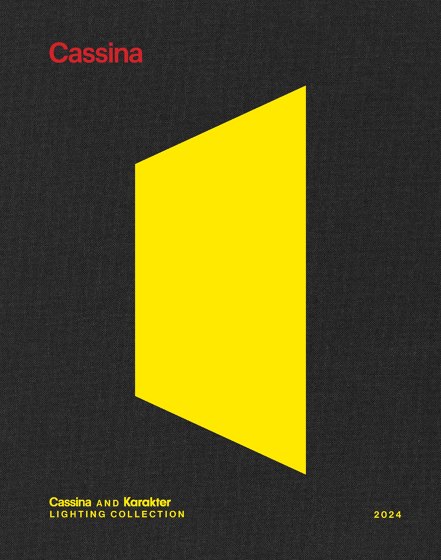531 Mexique Stool
Stools from Cassina, Designed by Charlotte Perriand
Product description
Low stool h. 45
Solid wood base available in natural oak, oak stained black, american walnut.
Extruded-aluminum legs available in gunmetal grey or matt black.
Solid wood base available in natural oak, oak stained black, american walnut.
Extruded-aluminum legs available in gunmetal grey or matt black.
Concept
Cassina presents for the first time new re-editions by Charlotte Perriand in wood, typical of the company’s high quality carpentry workmanship and testimony to the pioneering architect’s inspiring travels through the Orient
Indochine: noble materials for Charlotte Perriand’s personal use
The Indochine small swivel armchair is an adaptation in wood of the LC7 metal framed armchair which Charlotte Perriand designed in 1927, before she met Le Corbusier, and that was successively included in the range of furniture by Le Corbusier, Pierre Jeanneret, Charlotte Perriand presented at the Salon d’Automne in 1929.
The small armchair, designed in Vietnam in 1943 for personal use, was created with craftsmanship techniques and materials that were available during the war. The first project had three legs but did not offer the right stability: following this observation Perriand adapted it with a four-legged version. Charlotte Perriand always adapted models using the materials and techniques that were available to her, just like the project programme and the place of production.
Mexique: functionality, organisation and the warmth of natural materials
The Mexique table was created in 1952 for the students’ rooms of the Maison du Mexique at the Cité Universitaire Internationale in Paris. Its triangular shape with rounded corners was conceived in order to occupy as little space as possible in the room to facilitate movement between the armchair, bed and desk. This kind of table with tapered wooden legs and triangular table top was part of the en forme libre tables developed by Charlotte Perriand in 1938-1939. The triangular shape also allows more tables to be combined to form squares or rectangles, extending the area of use.
The thick solid wood top exudes natural beauty and warmth and the profile of the top’s border is functional for the shape and size of the hand: “What is sweeter than touching a polished fir table top, sweet like the legs of a woman”, Charlotte Perriand noted in the Triennale di Milano catalogue in 1951.
In 1952, Charlotte Perriand replaced the tapered legs with triangular sectioned legs in folded matt black sheet metal attached to the table top. Elegant and slender they were created to “give importance to the table top rather than its support” Charlotte wrote in 1950 in an article in the L’art d’Habiter.
In 1956, Charlotte Perriand created a low version of the Mexique table for the Galerie Steph Simon, the renowned Parisian gallery where Charlotte Perriand and Jean Prouvé were the main protagonists. As a result Perriand created a family of tables which harmoniously meet the organisational requirements for the night, day and communal environments.
The 17 products in the Charlotte Perriand Collection are all authenticated with the progressive production number, Charlotte Perriand’s signature and the Cassina I Maestri Collection logo.
Indochine: noble materials for Charlotte Perriand’s personal use
The Indochine small swivel armchair is an adaptation in wood of the LC7 metal framed armchair which Charlotte Perriand designed in 1927, before she met Le Corbusier, and that was successively included in the range of furniture by Le Corbusier, Pierre Jeanneret, Charlotte Perriand presented at the Salon d’Automne in 1929.
The small armchair, designed in Vietnam in 1943 for personal use, was created with craftsmanship techniques and materials that were available during the war. The first project had three legs but did not offer the right stability: following this observation Perriand adapted it with a four-legged version. Charlotte Perriand always adapted models using the materials and techniques that were available to her, just like the project programme and the place of production.
Mexique: functionality, organisation and the warmth of natural materials
The Mexique table was created in 1952 for the students’ rooms of the Maison du Mexique at the Cité Universitaire Internationale in Paris. Its triangular shape with rounded corners was conceived in order to occupy as little space as possible in the room to facilitate movement between the armchair, bed and desk. This kind of table with tapered wooden legs and triangular table top was part of the en forme libre tables developed by Charlotte Perriand in 1938-1939. The triangular shape also allows more tables to be combined to form squares or rectangles, extending the area of use.
The thick solid wood top exudes natural beauty and warmth and the profile of the top’s border is functional for the shape and size of the hand: “What is sweeter than touching a polished fir table top, sweet like the legs of a woman”, Charlotte Perriand noted in the Triennale di Milano catalogue in 1951.
In 1952, Charlotte Perriand replaced the tapered legs with triangular sectioned legs in folded matt black sheet metal attached to the table top. Elegant and slender they were created to “give importance to the table top rather than its support” Charlotte wrote in 1950 in an article in the L’art d’Habiter.
In 1956, Charlotte Perriand created a low version of the Mexique table for the Galerie Steph Simon, the renowned Parisian gallery where Charlotte Perriand and Jean Prouvé were the main protagonists. As a result Perriand created a family of tables which harmoniously meet the organisational requirements for the night, day and communal environments.
The 17 products in the Charlotte Perriand Collection are all authenticated with the progressive production number, Charlotte Perriand’s signature and the Cassina I Maestri Collection logo.
More about this product
Categorised in Seating - Stools - 3-leg base - open base - Seat unpadded - Wood - Seat solid wood - Metal - Aluminium - Base metal - Residential - Contract - Hospitality.
Manufacturer
Cassina
Family
Mexique / Indochine
Architonic ID
20057009
Order number
531
Year of Launch
2019
Also available in 2 other variants
More products from Mexique / Indochine family
Downloads
Manufacturer’s Catalogues
Contact information
Address
Via Luigi Busnelli 1, 20036 Meda (Mi) Italy
Get more information
Sign in to your Architonic account to have your contact details filled out automatically for each request.
Where to buy this product

More from
CassinaContact information
Address
Via Luigi Busnelli 1, 20036 Meda (Mi) Italy
Where to buy this product



